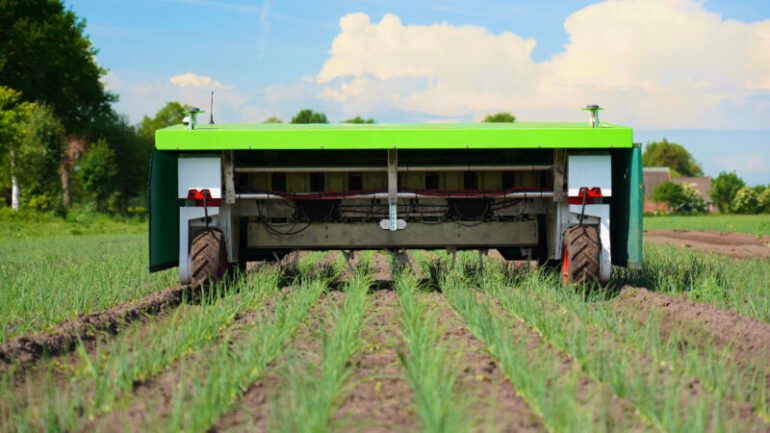TL;DR:
- Ekobot AB introduces an AI-driven robot for efficient weed removal in agriculture.
- The Ekobot WEAI operates autonomously, reducing the need for herbicides.
- The robot covers large fields, recognizing and plucking weeds with metal fingers.
- Ekobot’s innovation significantly reduces pesticide usage, promoting sustainability.
- Integration of 5G technology enhances communication and data sharing.
- “5G onions” with extended shelf life and enhanced taste are now available.
- Expansion plans include carrots and beets in addition to onions.
- The technology is expanding beyond Sweden to the Netherlands, Denmark, and Norway.
- It is expected to be available in multiple EU countries, the UK, and the US by 2030.
- AI-driven farming technology, coupled with pest-zapping lasers, promises a more sustainable agricultural future.
Main AI News:
In the realm of agriculture, the arduous task of weeding has long plagued the green thumbs of garden enthusiasts and farmers alike. When you scale it up to the vast expanse of farm-sized fields, the ordeal becomes a formidable nightmare. Traditional solutions often involve the use of herbicides, which, although efficient, come with potentially devastating repercussions for people, animals, and the environment. However, a Swedish innovator, Ekobot AB, has emerged as a savior in the field, introducing a wheeled robot with remarkable capabilities in autonomously identifying and swiftly plucking weeds with its steel fingers.
Enter the Ekobot WEAI, a four-wheeled wonder powered by batteries, capable of relentless operation for 10 to 12 hours on a single charge. Weighing in at a robust 600 kg (approximately 1322 pounds) and boasting a top speed of 5 km/h (2.5 mph), this mechanical marvel is expertly tuned for the precision weeding of fields brimming with onions, beetroots, carrots, or similar vegetables. Remarkably, it can cover approximately 10 hectares (about 24.7 acres) in a single day. This remarkable machine navigates with pinpoint accuracy using GPS RTK technology, further augmented by an array of safety sensors and visionary systems, ensuring it avoids unintentional collisions with objects or individuals in its path.
At the heart of Ekobot’s weed-whacking prowess lies its sophisticated AI-powered machine vision system. This system, meticulously trained to distinguish between weeds and valuable crops, enables the robot to identify its target as it glides over the farm field. Once the weed is in its crosshairs, the Ekobot deploys a series of steel fingers, swiftly uprooting and discarding the offending vegetation. The results speak for themselves, with Ekobot claiming a staggering 70 percent reduction in pesticide use during trials. The robot’s weed recognition system plays a pivotal role in this achievement, ensuring that it does not mistakenly uproot the precious crops it’s meant to protect.
Two years ago, Ekobot embarked on a groundbreaking collaboration with Swedish telecommunications giant Telia, ushering in the era of 5G mobile technology integrated into the robot. This innovation allows the Ekobot to communicate seamlessly with a central server, sharing valuable learning data from any corner of a farm field. The pilot project for onion cultivation was just the beginning, and the latest news is nothing short of groundbreaking – the world now has access to the first-ever “5G onions” produced using this revolutionary weeding method.
“The 5G onion has proven to have an extended shelf life, something that contributes to a reduction in wastage,” asserts a press release from Telia. “The 5G onion is not only more sustainable—it also tastes better. This is because efficient weeding and reduced use of pesticides enables onion shoots to grow more freely and for longer, enabling the onions to receive more sunlight and nutrients, making them more hardy and tasty.”
Excitingly, a limited quantity of these tantalizing 5G onions is now available at select Telia stores, promising not just sustainability but also an enhanced flavor profile. Ekobot’s transformative weeding technology is poised for expansion, with plans to introduce it to carrot and beet fields. Beyond the borders of Sweden, this groundbreaking tech is already making waves in the Netherlands and is soon set to revolutionize agriculture in Denmark and Norway. Telia envisions a promising future, predicting that the Ekobot system will be available “in 9 EU countries, the United Kingdom, and the United States” by the year 2030. With additional research exploring the use of lasers to zap airborne pests, the combination of AI and cutting-edge technology holds the promise of ushering in a sustainable and environmentally friendly farming revolution, provided it gains widespread adoption.
Conclusion:
Ekobot’s innovative robot and the emergence of “5G onions” mark a significant advancement in sustainable agriculture. The combination of AI-driven precision weeding and 5G connectivity promises to transform farming practices globally, reducing pesticide usage and enhancing crop quality. This technology trend is poised to create new market opportunities and drive a shift toward more environmentally friendly farming practices.

